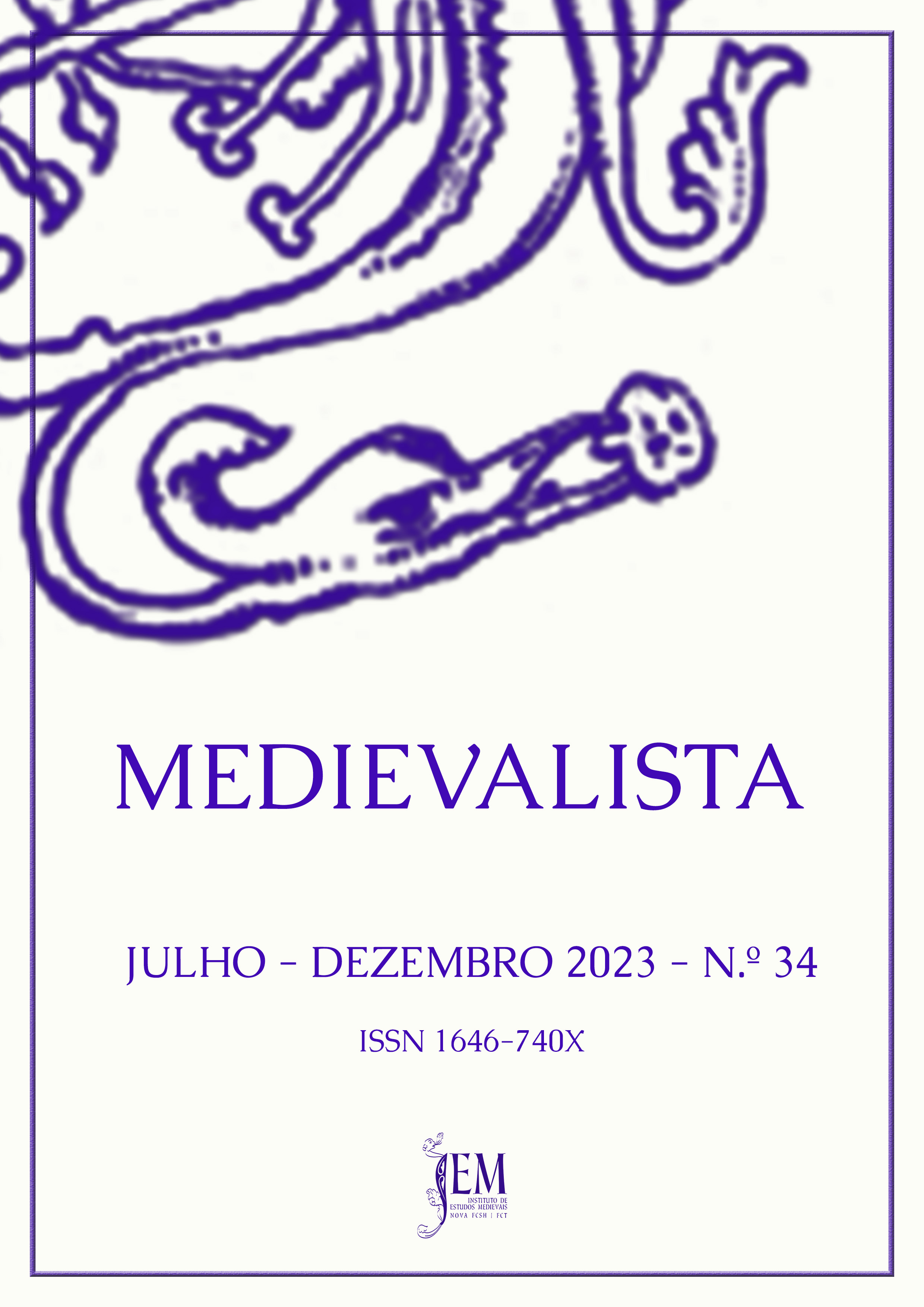History, hagiography, romance… A Middle English prose Brut’s layered portrayal of Athelstan
DOI:
https://doi.org/10.4000/medievalista.6924Keywords:
Athelstan, chronicle, Brut, legend, narrativeAbstract
Athelstan’s reputation and accomplishments as the king credited with being the first to rule over all of England led to his being celebrated in the Middle Ages in art, coinage, romance, travel narratives, and chronicles. In the prose Brut tradition, his depiction is, for the most part, focused on his military accomplishments, with little elaboration. However, the abbreviated Middle English prose Brut preserved in Edinburgh University Library MS 184 and two other manuscripts is unusual in its blending of narrative elements from historical accounts, hagiography, and romance to portray Athelstan as an English hero, and in its telling its 15-century audience where they could still see physical relics of Athelstan’s reign in their own day, giving them the opportunity to be vicariously connected to the storied history of their nation. This article traces sources and traditions this Brut’s compiler most likely drew from and considers what implications this may have for our understanding of this particular manuscript and of the evolution and adaptation of Brut chronicles in the late Middle Ages.
Bibliographical references
Manuscript Sources
Edinburgh, Edinburgh University Library, MS 184.
London, British Library, MS Harley 63.
Printed Sources
Aelred of Rievaulx – Genealogia regum Anglorum. In MIGNE, J. P. Migne (ed.) – Patrologiœ cursus completus, series Latina, 122 Vols. (Paris: 1844-1864), xcv (1855), cols. 724-725.
BRIE, Friedrich W. D. (ed.) – The Brut or The chronicles of England. 2 Vols. Oxford: EETS, O.S. 131 and 136, 1906-08. Vols. 1 and 2 reprinted together, 1999.
EDWARDS, Edward (ed.) – Liber Monasterii de Hyda. London: Rolls Series 45, 1866.
HALES, John W.; Frederick J. Furnivall (eds.) – Bishop Percy’s folio manuscript, Vol. II, Part II. London: N. Trübner, 1868.
HAYDON, Frank Scott (ed.) – Eulogium historiarum. Vol. 2. Rolls Series 9: London, 1857.
HENRY OF HUNTINGDON – Historia Anglorum. Ed. and trans. Diana Greenway, Oxford: Clarendon P, 1996.
HIGDEN, Ranulf – Polychronicon Ranulphi Higden, monachi Cestrensis; together with the English translation of John of Trevisa and of an unknown writer in the 15th century. Ed. Vols. 1-2, C. Babington; ed. Vols. 3-9, J. R. Lumby, vol. 9. London, 1865-1866.
KNIGHTON, Henry – Chronicon Henrici Knighton. Ed. J. R. Lumby. Rolls Series 92: London, 1889-1895.
LUARD, Henry Richards (ed.) – Flores historiarum. Vol. 1. London: Rolls Series 95, 1890.
LYDGATE, John – The minor poems of John Lydgate. Part II. Ed. Henry Noble Maccracken. Oxford: EETS, O.S. 192, 1934.
MARVIN, Julia – The oldest Anglo-Norman prose Brut chronicle: An edition and translation. Woodbridge: Boydell, 2006.
O’FARREL-TATE, Una (ed.) – The abridged English metrical Brut. Heidelberg: C. Winter, 2002.
RALF DE BOUN – Le petit Bruit. Ed. Diana B. Tyson. London: ANTS, 1986.
STONES, E. L. G. (ed. and trans.) – Anglo-Scottish relations 1174-1328: Some selected documents. Oxford: OUP, 1965.
STUBBS, William – Memoriale fratris Walteri de Coventria: The historical collections of Walter of Coventry. 2 vols. London, 1872-1873.
TROUNCE, A. McI. (ed.) – Athelston: A Middle English romance. EETS, O.S. 224, 1951.
WILLIAM OF MALMESBURY – Gesta regum Anglorum. Vol. I. Ed. and trans. R. A. B. Mynors, R. M. Thomson, & M. Winterbottom. Oxford: Clarendon P, 1998.
ZETT, Edward (ed.) – An anonymous short metrical chronicle. London: EETS, O.S. 196, 1935.
ZUPITZA, Julius (ed.) – The romance of Guy of Warwick: Edited from the Auchinleck MS in the Advocates’ Library, Edinburgh and from MS 107 in Caius College, Cambridge. Oxford: EETS, E.S. 42, 49 and 59, published in 1966 as one volume.
ZUPITZA, Julius (ed.) – The romance of Guy of Warwick: The second or 15th-century version. Oxford: EETS, E.S. 25 and 26, published in 1966 as one volume.
Studies
ASHE, Laura – Fiction and history in England, 1066-1300. Cambridge: CUP, 2007.
BLAIR, Claude (ed.) – The crown jewels. London: HMSO, 1998.
BLAIR, Claude – “A drawing of an English medieval royal gold cup”. The Burlington magazine 121.915 (Jun. 1979), pp. 370+372-373.
COLLINGWOOD, W. G. – “Arthur and Athelstan”. Saga-Book 10 (1928), pp. 132-144.
EDWARDS, A. S. G. – “The Speculum Guy de Warwick and Lydgate’s Guy of Warwick: The non-romance Middle English tradition”. In WIGGINS, Alison; FIELD, Rosalind (eds.) – Guy of Warwick: Icon and ancestor. Cambridge: D. S. Brewer, 2007, pp. 81-93.
L'ESTRANGE, A. G. – Royal Winchester: Wanderings in and about the ancient capital of England. London: Spencer Blackett, 1889.
FOOT, Sarah – “Æthelstan (893/4-939)”. Oxford dictionary of national biography. Oxford: OUP, 2004. Online ed., Sept. 2011. Accessed on 19 December 2023. Available at http://www.oxforddnb.com/view/article/833
FOOT, Sarah – Æthelstan: The First King of England. New Haven, CT: Yale UP, 2011.
LEWANDOWSKY, Stephan, et al. – “Misinformation and its correction: Continued influence and successful debiasing”. Psychological science in the public interest 13/3 (2012), pp. 106-131.
MARVIN, Julia – “Havelok in the prose ‘Brut’ tradition”. Studies in philology 102 (2005), pp. 280-306.
MATHESON, Lister M. – The prose Brut: The development of a Middle English chronicle. Tempe, AZ: U of Arizona P, 1998.
MOLL, Richard J. – “‘Nest pas autentik, mais apocrophum’: Haveloks and their reception in medieval England.” Studies in philology 105 (2008), pp. 165-206.
MULLIGAN, Elliot – “King who? Poll’s shock winner as little-known Athelstan is named our top monarch”. Daily Mail, Daily UK news. 18 November 2021. https://dailyuknews.com/uk-news/king-who-polls-shock-winner-as-little-known-athelstan-is-named-our-top-monarch/
RICHMOND, Velma Bourgeois -– The legend of Guy of Warwick. New York: Garland, 1996.
ROUSE, Robert Allen – The idea of Anglo-Saxon England in Middle English romance. Cambridge: D. S. Brewer, 2005.
SPENCE, John – Reimagining history in Anglo-Norman prose chronicles. York: York Medieval P, 2013.
TREHARNE, Elaine M. – “Romanticizing the past in the Middle English Athelstan”. Review of English studies 50:197 (1999), pp. 1-21.
TURVILLE-PETRE, Thorlac – England the nation: Language, literature, and national identity, 1290-1340. Oxford: Clarendon, 1996.
WILSON, R. M. – The lost literature of medieval England. London: Methuen, 1952.
WILSON, Susan E. – The life and after-life of St. John of Beverley. Aldershot, Hampshire: Ashgate, 2006.
Downloads
Downloads
Published
How to Cite
Issue
Section
License
Copyright (c) 2024 Medievalista

This work is licensed under a Creative Commons Attribution 4.0 International License.





















